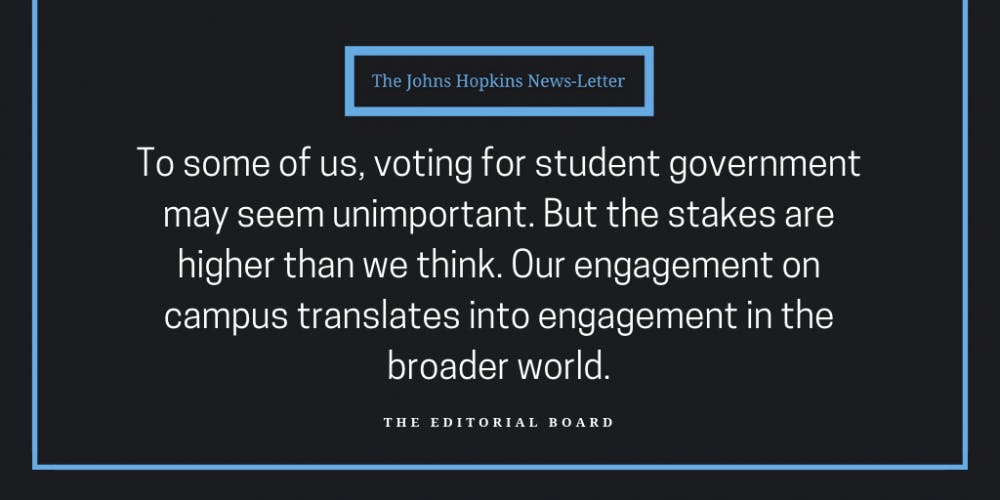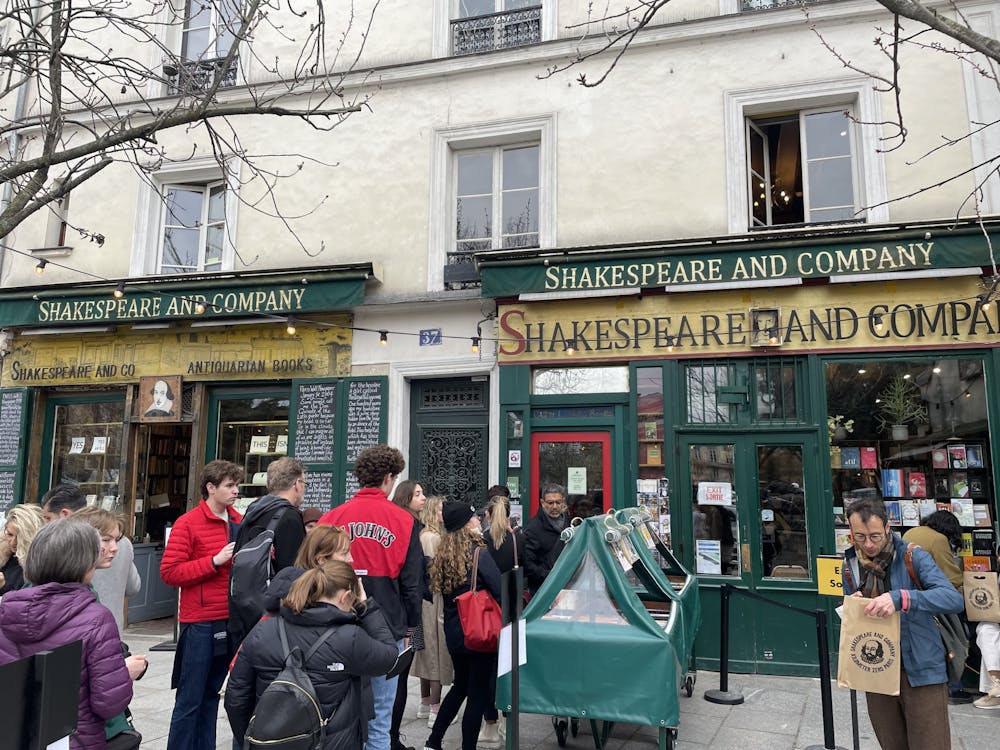After only one student ran for Senior Class Council during Spring 2018, the Committee on Student Elections (CSE) held a special election this fall for five open seats, doing away with the usual petition process. Nine candidates ran; voting took place last week and election results were announced this Monday.
Looking at the voter turnout percentages, it’s likely that you either didn’t know or didn’t care. Voter turnout for seniors in the special election was 14.3 percent, marking a 52 percent drop from last year’s general elections, when voter turnout was 30.2 percent.
In interviews with The News-Letter, Student Government Association (SGA) members attempted to explain this decrease in voter turnout. One speculated that last year’s elections had stronger publicity. Another attributed it to the narrow time frame between the two Senior Class Council elections. These are likely variables, and we hope that SGA members will keep them in mind for future elections.
We’re also concerned, however, that these numbers may be an indicator of indifference towards student government at Hopkins. Assuming they are, we think it’s worth examining why.
It wouldn’t be accurate to say that Hopkins students are apathetic, even if we’re not the most vocal campus in the nation. Over the past few years, we’ve witnessed fellow students mobilizing and fighting for causes they care about.
We’ve seen Refuel Our Future push the University towards divesting from fossil fuels in protest after protest. We saw hundreds of students convene in front of University President Ronald J. Daniels’ house last spring after administrators announced their intent to create a private police force for Hopkins. We watched students join the Baltimore Uprising, peacefully expressing their opposition to systemic racism and police brutality.
Then why don’t we vote, even when SGA is supposed to be acting in our interests? Maybe students don’t believe that SGA can make a difference. Last semester, we published an editorial on how SGA does not have enough influence over University decisions. SGA may share the student body’s interests and relay them to the University, but ultimately they have no real power. Months later, that reality still stands, and SGA members acknowledge as much in interviews with The News-Letter.
Maybe students would be more likely to vote for class council elections when candidates have distinct platforms. It’s easy enough to take stances, but SGA candidates should accompany these stances with concrete plans and action. All too often, candidates have broad, indistinguishable platforms.
Or maybe as college students, we’re just too lazy to vote. We’re certainly eager to express our opinions and engage in activism, whether it be on campus or beyond. But when it comes to casting our ballots, many of us don’t show up.
This doesn’t just apply to SGA elections. Participation in U.S. elections is also low, and young adults aged 18 to 30 have the lowest voter turnout of any age group. We prioritize our many commitments — studying, social life, applying for internships — over doing our small part in fighting for the change we want to see.
Regardless, SGA must shoulder some of the responsibility. If Hopkins students are lazy and uninterested in voting, SGA must not passively accept that as a reality that can’t be changed.
As of now, we hope that SGA is on the right path toward fulfilling its role as an advocate for student interests. The recent fall referendum is a new development, and we believe it can be a useful platform for critical conversations surrounding a myriad of issues: mental health on campus, the private police force bill, campus diversity and resources for sexual assault survivors. We believe that a referendum can bring our interests to the forefront.
But considering the lack of updates we have on the fall referendum and the lack of understanding we have of how it will proceed, we also have our doubts. Have we not already voiced our interests in the past? Isn’t the administration already familiar with our demands? What can the fall referendum do for us that we haven’t already done for ourselves? We want to know.
Nevertheless, it would be unfair of us to say that SGA has done nothing. While it may not hold sway over major administrative decisions, we should also look at the smaller steps SGA has taken to foster a climate of student engagement.
Last year SGA facilitated the University’s partnership with TurboVote, an online voting registration service, to simplify the voting process for Hopkins students. After the Parkland shootings, SGA held a campus walk-out in support of gun control. Weeks later, SGA members arranged for buses to take Hopkins students to March For Our Lives in Washington, D.C. During Orientation Week this year, they organized the first Student Activism Fair to introduce freshmen to as many as 20 student activist groups. All of these actions have played a role in amplifying student voices at Hopkins.
The initiatives SGA undertakes, however, are fruitless if we do not take responsibility, too. However dissatisfied you are with SGA and its potential to implement meaningful change, it is your duty to vote and do your part in making SGA better. If we don’t contribute, we cannot expect SGA to effectively represent and act in our interests.
To some of us, voting for student government may seem unimportant. But the stakes are higher than we think. Our engagement on campus translates into engagement in the broader world, in our fight against systemic racism and police brutality, against climate change and sexual violence, against the various social inequities that pervade the University, Baltimore and the nation. As Hopkins students, we must do what we can to bolster student government.





